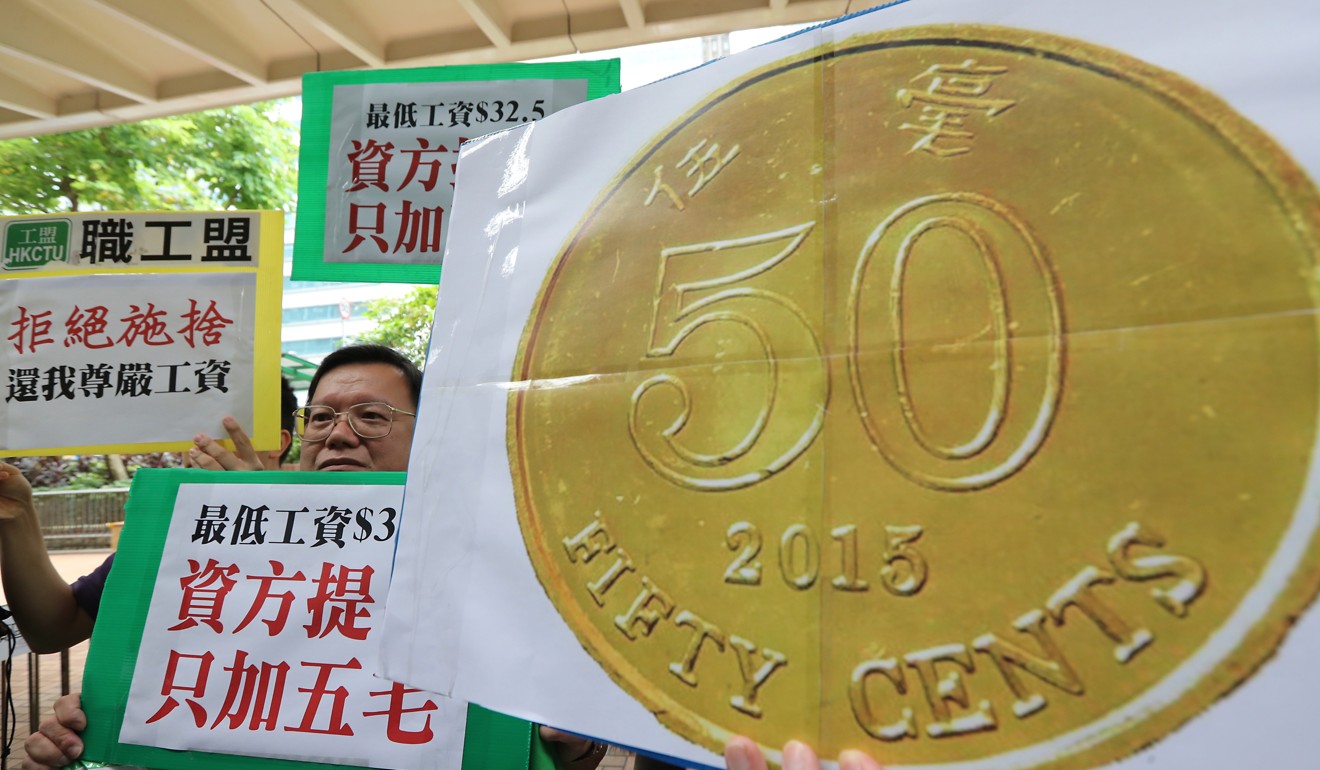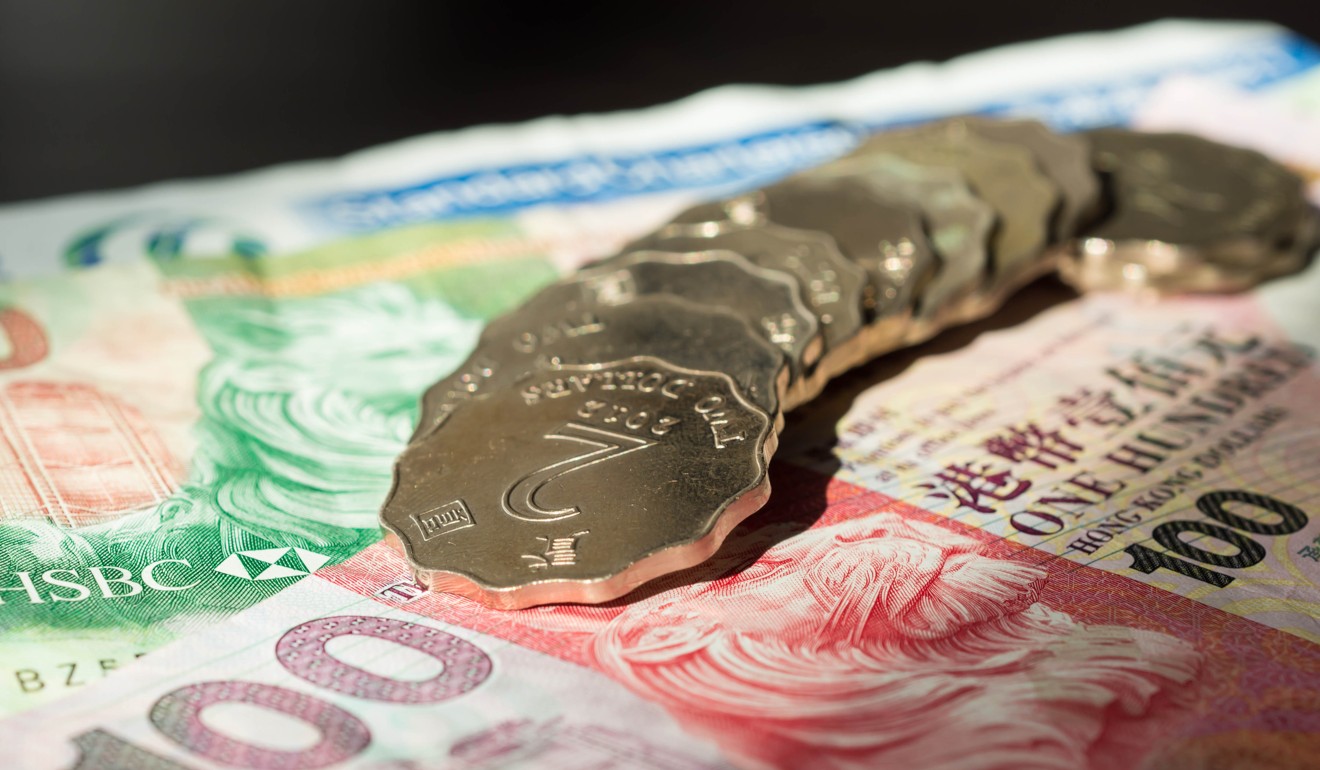
Will increasing Hong Kong’s minimum wage help struggling part-time workers?
While workers call for higher wages, some say more is needed to protect employees from exploitation
Danny Luk did not enjoy his brief stint in Hong Kong’s “infantry”... and he quit after 10 days.
He was not in the armed forces, but his days were long andll arduous. He lugged around at least 10kg of parcels to deliver, working from 9am to 6.30pm without a lunch break or paid leave as a foot soldier in the city’s courier services sector.
“I had no labour insurance, no medical insurance, no formal contract … and I think they paid too little compared to what I had to do,” Luk said.
Minimum wage for foreign domestic helpers raised by 2.3 per cent, but worker advocates unhappy
While Luk was able to find greener pastures, nearly half of the 2,000 employees in the courier industry work in those conditions – making it the worst among the 15 lowest-paying sectors in terms of break time and paid leave, according to the Minimum Wage Commission.

As Hong Kong celebrates Labour Day, the government-appointed commission is halfway through its six-week public consultation to review the city’s HK$34.50 (US$4.40) per hour minimum wage.
Luk said the rate should be raised “at least above HK$40”, considering living costs and labourers’ lack of bargaining power for better conditions.
“I knew something was wrong, but if I spoke up, I might end up losing my job,” Luk said. “And I don’t think more regulations can bring real and quick changes because some companies always manage to circumvent.”
Hong Kong’s low-pay industries ‘face HK$2.9 billion hit if minimum wage rises to HK$42’
The Employment Ordinance stipulates that part-time employees who work more than 18 hours a week, four weeks a month, should enjoy the same labour rights as full-time workers, including paid leave and compensation insurance. However, critics say that employers in some sectors use part-time workers to circumvent benefits.
Raising the minimum wage, in Luk’s opinion, would be the “most effective way to help the workers”.
But Cheung Lai-ha, vice-chairwoman of the Confederation of Trade Unions, said the Labour Department should do more to fight worker exploitation while also calling on employees to lodge complaints against unfair and illegal treatment.
“Minimum wage and proper labour welfare are not mutually exclusive,” Cheung said. “The minimum wage in Hong Kong always lags because it’s based on economic statistics collected two years ago. But laws protecting labour welfare are in place.”
Hong Kong’s minimum wage is up for renewal in a year, on May 1, 2019. The Commission will base its recommendation on statistics from May 2017 which show that 22.4 per cent of employees in the 15 lowest-paying sectors – or 188,600 workers – earned less than HK$40 per hour, including 16 per cent of local couriers.
Minimum wage has had minimum effect for working families, Oxfam says
To pay these workers HK$40 per hour employers would have to spend HK$1.55 billion more a month on salaries. Although for the courier sector, the additional monthly cost would only be HK$3.8 million, the commission estimated.

The minimum wage has risen every two years since a level of HK$28 per hour was adopted in 2011. The rises have always beaten inflation, ranging from 6.2 per cent to 8.3 per cent – or between HK$2 and HK$2.50.
Luk, 34, who left school after completing Form Five, was offered HK$370 per day if he could work 22 days a month by the company which offered him his “infantry job”. While HK$38 per hour was above the minimum, it was still barely enough to make ends meet.
He spends HK$3,500 a month on a subdivided 50 sq ft flat in Sai Wan and HK$3,600 on basic food and transport costs, leaving him with just HK$900 from his HK$8,000 salary.
“I was so tired that I fell asleep on the bus from the company in Lai Chi Kok to my home in Sai Wan,” Luk said. “When I was home, my legs were so painful that I felt as if they didn’t belong to me any more. My fingers and palms had many cuts and cracks. And my shoulders and back would seriously hurt.”
Who drinks lattes in Hong Kong? Not the minimum wage earner
Luk said the company employed men and women, young and old to work in the so-called infantry.
Cheung slammed the courier industry for the “exploitation of underprivileged employees”, including those who are elderly, disabled and under-educated. She urged the Labour Department to “conduct more serious inspections and impose heavier penalties against companies violating labour laws”.
“All companies should keep a record of their employees’ leave, through which malpractices can be easily identified if the Labour Department takes a look,” Cheung said.

Cheung also encouraged workers to report to unions or the government. “They only have to provide some basic information and don’t have to testify against their employers.”
But Luk was not convinced.
“The politics in Hong Kong have become so complicated that I don’t even know who is on which side and who is speaking for whom.”
The Hong Kong Courier Association, which represents major operators in the city, said it was unfair to pin the blame on employers relying on part-time workers, and that it was a matter of supply and demand.
Hong Kong’s new minimum wage is far too low
“Besides the flexibility, some people prefer working as part-time couriers because these temporary jobs are usually paid by the day,” association chairman Gary Ng Kwong said.
Ng said even though the industry was facing a chronic manpower shortage, the minimal profit margin meant it was not feasible to lure workers by raising pay.
“More people have been shopping online in recent years and driving up the shipment volume. But these are mostly bargain shoppers so do you expect them to pay a premium for courier services?”
Ng also did not believe raising the minimum wage would help ease the problem. “It is a structural problem for the Hong Kong economy. Under a [higher] minimum wage, people would simply choose jobs which are not as tedious, and the courier industry would naturally lose out.”

Instead of seeking help from unions or the Labour Department, or bringing the issues up with his employer, Luk resigned and joined another local courier company.
Working from 8.30am to 6.30pm six days a week, Luk is now paid HK$450 a day, or HK$11,500 a month, and the company provides breakfast and lunch when he works. More importantly, Luk is no longer a foot soldier, but gets to ride in a van when making deliveries.
A higher hourly wage and better working conditions have given Luk new hope in life.
“I should be able to save up HK$10,000 by the end of this year. Then I can take a driving course and get a licence, which will help me become a driver and get higher pay.”
What can you buy with the new HK$34.50 minimum wage?
A Labour Department spokesman refused to disclose information regarding complaints against individual companies. Also, the department did not collect statistics on complaints by sectors and types.
The department “takes vigorous enforcement action”, including surprise inspections on employers’ compliance with statutory requirements, the spokesman said.
Employees with questions or concerns over their employment rights and benefits may seek advice or lodge complaints at 10 branch offices of the department’s Labour Relations Division across Hong Kong.
Additional reporting by Raymond Yeung

